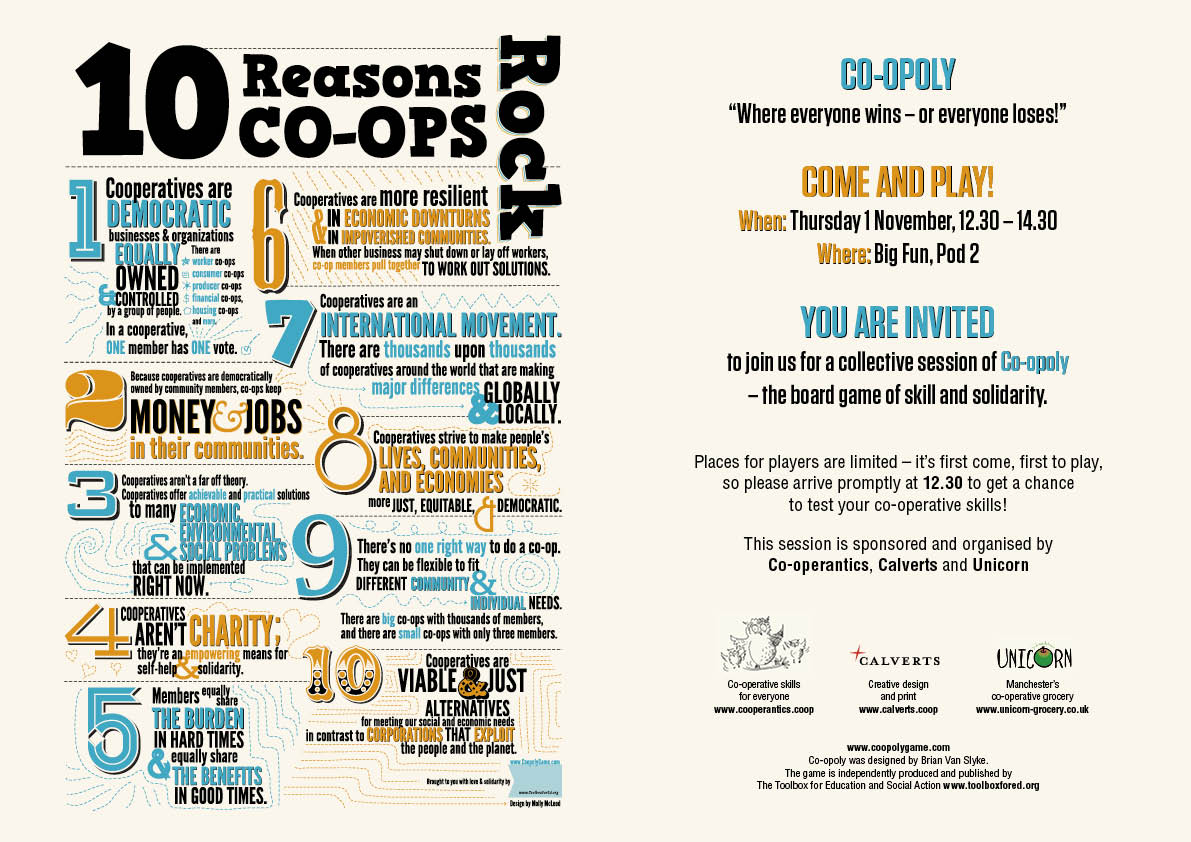Happy Holidays from Co-operantics, here’s to health, happiness & co-operation!
How about some festive music-making fun (thanks to Lizzie & Wayne)
reclaiming business for good – helping people work together in ‘flat’ co-operative structures
Happy Holidays from Co-operantics, here’s to health, happiness & co-operation!
How about some festive music-making fun (thanks to Lizzie & Wayne)
Although it has been out in the wild for over a year, we think this video is a great introduction to the wider movement for members of co-operatives. You could use it in your induction processes
If your co-operative is located in the South East of England or London, we may be able to provide with some support for free. As part of the regional co-operative consortium South East Co-operative Support we are able to work with co-operatives who apply for support from The Co-operative Enterprise Hub. To make sure you identify the right sort of support, and that the work is allocated to Co-operantics, we advise having a chat first. Nathan is our contact for these areas so contact him using the form or email address on our Contact Us page.
People interested in starting a new co-op can also receive assistance through The Co-operative Enterprise Hub.
We have had a blog introducing the need for Co-operative Skills published on the Guardian Social Enterprise Network’s Co-operatives and Mutuals Hub. If you are interested you can read it here:
http://www.theguardian.com/social-enterprise-network/2013/apr/19/cooperative-skills-what-are-they (Link updated 19 June 2014)
Co-operantics are pleased to announce that we were successful in being accepted onto the Wales Co-operative Centre‘s provider list to deliver support to Housing Co-operatives in Wales. We hope that with our focus on co-operative skills in addition to governance processes and operational issues, the groups we work with will be in stronger position to thrive.
Both Kate and Nathan have worked with a variety of Housing Co-operatives in the past, and Co-operantics are already engaged in another piece of work with a long established Housing Co-op. In fact, Nathan’s first paid development worker role was as a Housing Co-operative specialist!
2012 was a good year for Co-operantics! We became a co-op, with Nathan Brown joining as the first of (we hope) many new members. 2012 highlights included CUK’s Co-operative Skills Masterclass in London, Richard Sennett was a thoughtful key speaker, and we ran the jigsaw game, always a rich source for reflections on communications in co-operatives. We were proud to be commissioned to work with Jim Brown and Mick Taylor on a CEH-funded national training and CPD programme for co-operative development practitioners – delivering and assessing the Understanding Co-operative Enterprise (UCE) Unit.
We were very excited to attend Co-ops United in Manchester in October, it was a great honour to meet co-operators from all over the world – and we were especially thrilled to meet co-op developers from the United States and Canada and hear their views on the training of co-operative business advisers.  Presenting the Co-opoly game was the cherry on the cake! Our ‘pod’ attracted huge interest, with lots of people popping in to see what was going on and hear about this great new game. The players clearly enjoyed it and the Guardian interview helped to promote the game here in the UK – we were proud and happy to hear that sales from this side of the Atlantic increased as a result.
Presenting the Co-opoly game was the cherry on the cake! Our ‘pod’ attracted huge interest, with lots of people popping in to see what was going on and hear about this great new game. The players clearly enjoyed it and the Guardian interview helped to promote the game here in the UK – we were proud and happy to hear that sales from this side of the Atlantic increased as a result.
However, perhaps the most heartening development for us in 2012 was the growing and continuing interest in ‘co-operative skills’. We attended ‘Co-operative Working Skills – the heart and muscles of co-operative management’ at the CEH Conference, where Bob Cannell talked about:
and much more. In the short space of time available, we could only touch on some of these important issues. However you can get more insights drawn from Bob’s 25+ years’ experience as a worker owner at SUMA at his blog
Bob, along with Britta Werner from Unicorn Wholefood Grocery and others will be delivering ‘Governance and participation in co-operatives’ – a workshop for co-operative development advisers on 22nd January. The workshop aims to explore how we, as co-operative development practitioners, assess support needs in this area, how we work with client groups to promote good governance and participation, and whether the recently revised Worker Co-operative Code of Governance provides a starting point for co-operatives to diagnose, develop and improve their practices. Cooperantics will be there, keen to learn from others and share our experience.
Finally, we were very pleased to read in the Blueprint for a Co-operative Decade:
“Participation: The aim is to elevate participation within membership and governance to a new level, and to do this by focussing on the practical aspects of participation…”
And we hope to be able to contribute to the ongoing debates – not least by building our collection of hints, tips, tools & techniques for improving co-operative working.
We’d be interested to hear your thoughts:
You can leave comments here for the next fortnight – alternatively, email us at
kate[at]cooperantics.co.uk
 Co-operantics, together with Unicorn Co-operative Grocery, Calverts & Cornerstone Housing Co-op are proud to present the first mass Co-opoly game playing experience in the UK! In Co-opoly: The Game of Cooperatives, players collaborate to found and run a democratic business. In order to survive as individuals and to strive for the success of their co-op, players make tough choices regarding big and small challenges while putting their teamwork abilities to the test. This is an exciting game of skill and solidarity, where everyone wins – or everybody loses. By playing Co-opoly, players discover the unique benefits, challenges, and operations of the co-operative world – as well as the skills needed to participate in a co-op!
Co-operantics, together with Unicorn Co-operative Grocery, Calverts & Cornerstone Housing Co-op are proud to present the first mass Co-opoly game playing experience in the UK! In Co-opoly: The Game of Cooperatives, players collaborate to found and run a democratic business. In order to survive as individuals and to strive for the success of their co-op, players make tough choices regarding big and small challenges while putting their teamwork abilities to the test. This is an exciting game of skill and solidarity, where everyone wins – or everybody loses. By playing Co-opoly, players discover the unique benefits, challenges, and operations of the co-operative world – as well as the skills needed to participate in a co-op!
Remember to arrive on time at 12.30 – it’s a board game and it takes at least an hour to play – see you there!
On the Eighth Day Wholefood Co-operative, Manchester
have each won a lovely box of chocs as a reward for taking part in the Cooperantics client questionnaire earlier this year! Booja Booja chocs are on their way!
One of our questions was a request for co-operatives to share games, techniques, tools & tips for promoting and developing co-operative skills and we received some positive responses, which we will be sharing here.
The first one comes from the True Food Community Co-op:
Yes… Network, Network, Network! and get as many customers as possible to do the same. Find a publicity message and recognisable image that seems to attract positive comment, and then network with it. Start now and don’t stop – and have fun with it. Occasionally change/update your message and image and share the fun with your customers. Make them smile, we all need a laugh now and then!
Good luck from us all.
Thanks True Foodies!
& watch this space for more ….
But now a co-operative! Cooperantics LLP was recently registered and we have applied for membership of Co-operatives UK. Partners Kate Whittle & Nathan Brown aim to provide co-operative skills development and other co-operative development services including support, advice, training, facilitation, coaching and the creation of written materials. Although we are starting small we hope in due course to bring in other members, and in particular we will be investigating the potential for developing a co-operative skills apprenticeship scheme.
My favourite magazine lands on the doormat – The Land – an occasional magazine about land rights – serious and interesting reading over breakfast.
The lead story – ‘Less Dreaming, More Digging’ couldn’t be more timely, and in one of the many informative and thought-provoking stories, Ed Hamer asks ‘Can Britain Farm Itself’
Given the highest rate of UK unemployment for nearly two decades, and the sharpest spike in food prices in living memory, the author asks if farming could once again become a major employer in the UK and comes up with a ‘rustic guide’.
After some rustic number crunching, the author reveals that the UK currently devotes “the equivalent full time labour of 16% of our agricultural workforce to the production of goods for export, while at the same time 2010 food imports equated to an estimated 91,893 full time agricultural jobs”. This means that if we cut exports and replace imports with domestic jobs, the UK farming sector would increase by 66,315 full time equivalents.
Perhaps more usefully, if we calculate the labour demanded by a standard diet supplied entirely from domestic resources, it is possible to feed 62.3 million people based as closely as possible on the balance of farming and land use in the UK today.
But of course the bigger question remains: How many people could we employ if we radically change the way we farm?
More rustic number crunching reveals that assuming a modest target of meeting 90% of domestic demand, we can assume a budget of £140 billion consumer spending (based on Defra 2010 figures). Currently, our centralised retail model awards the producers just 8% (£11.2 billion). When applied to 50 hectares of farmland allocated to each full time employee in Ed Hamer’s model, this equates to a gross margin of £33k per person per year. This is not sufficient for a 120 acre mixed holding – so to support this level of agricultural employment the share of the food pound received by producers would need to be significantly increased.
So the author proposes reorienting supply towards local markets so that producers can receive a higher proportion of consumer spending. By aiming at the 58p in the £ secured by Farmers Markets, or 21p from local retailers, the picture starts to look more achievable. A farmer could expect an estimated gross £98,562 based on 2010 figures, from a 50 hectare holding with a combination of vegetables, cereals and beef, of which she sold a quarter through a Farmers Market, a quarter through local retailers and still gave half of it away to Tescos (!)
Ed Hamer acknowledges that you can prove anything with statistics, and that the model he describes is idealistic, and needs robust research, modelling and testing. However the statistics quoted in the report reveal the insanity of our current model – for example in 2010 we exported 0.25 and imported 0.28 million tonnes of potatoes. The UK is not even self-sufficient in produce suitable to its climate and soil, and with all the associated social and environmental problems arising from the current model, we need a significant policy shift towards promoting production and consumption of domestic produce.
You can read the complete article and many other stimulating and readable articles at:
www.thelandmagazine.org.uk/articles/can-britain-farm-itself-2